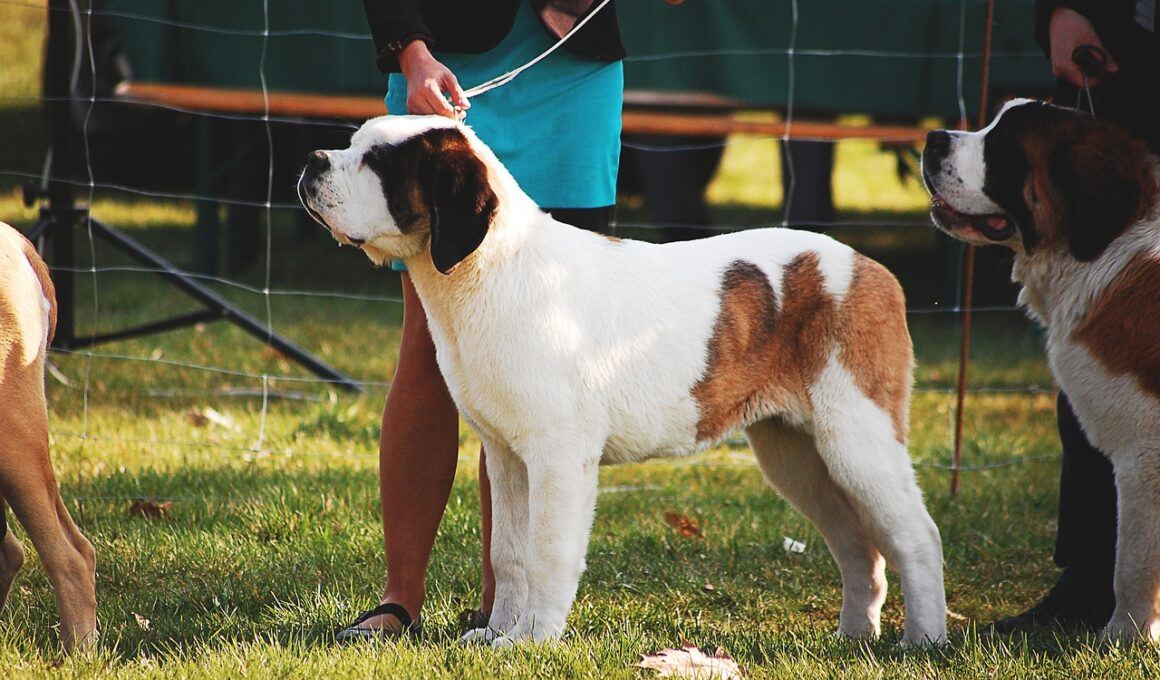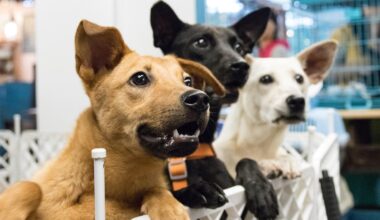How to Choose the Best Dog Breed for Junior Handlers
Choosing the right dog breed for junior handlers is crucial for a successful dog show experience. The breed’s temperament plays a significant role in how well a child can interact with and train their dog. Generally, breeds known for their friendly and easy-going nature are preferable. For instance, consider breeds like Labrador Retrievers and Golden Retrievers, which are not only affectionate but also patient. Furthermore, size matters; smaller dogs are often easier for children to manage. Breeds such as Beagles or Pugs can be ideal due to their compact size and friendly demeanor. Additionally, energy levels should be considered. Breeds that require less exercise might be better suited for junior handlers. Less active breeds, like Bulldogs or Shih Tzus, may prove to be favorable choices. It’s also essential to consider the groom and upkeep demands of the dog breed. Breeds that need minimal grooming, such as Boxers, are often easier for kids to handle. Encouraging children to engage with their chosen breed will lead to a more enjoyable experience in training.
Understanding the commitment required for dog ownership is essential for junior handlers and their families. Dog ownership is not just about participating in shows; it requires dedication and responsibility. Junior handlers must be prepared to spend time caring for their dogs. This includes daily exercises, feeding, and grooming. Each breed varies significantly in care requirements, which families should acknowledge when making a decision. For example, some breeds, like Poodles, need regular grooming services and more frequent baths. On the other hand, breeds like Dachshunds require less maintenance. Training should also be a priority. A breed’s trainability impacts how effectively a child can handle their dog in various situations. Breeds such as Border Collies excel in training due to their intelligence, but they also require experienced handlers. Therefore, pairing them with a motivated child can yield excellent results. Moreover, selecting a breed that has a history of being a companion animal can further enhance the bond between the dog and the handler. Good companionship will not only make training easier but also enhance the overall experience for the child.
Knowledge about various dog breeds is beneficial for junior handlers and their parents. Each breed has distinctive traits and quirks that can influence the dog’s suitability for shows and family life. Participating in dog shows should be a fun experience rather than a source of stress for the young handler. Therefore, engaging with local breeders or attending events can provide insights into specific breeds. Observing dogs in action and speaking with experienced handlers can be invaluable for understanding breed characteristics. Websites such as the American Kennel Club offer extensive information on various breeds, including their temperaments, exercise needs, and training requirements. Reading success stories from previous junior handlers can offer motivation and guidance on choosing a breed. Another option is to attend dog training classes, where junior handlers can receive first-hand advice on handling different breeds effectively. Visiting shelters might also reveal mixed breeds that exhibit desirable traits. Some mixed-breed dogs can possess the best characteristics of various breeds, making them unique companions. Ultimately, knowledge will guide junior handlers towards making informed decisions when choosing their ideal dog.
Building a Positive Trainer-Dog Relationship
Fostering a positive relationship between the junior handler and their dog is integral to success in dog shows. The bond they establish will significantly impact the dog’s performance and willingness to cooperate during training sessions. Interaction should be positive, recognizing the dog’s efforts and progress. Using treats or verbal praises can reinforce desired behaviors and build trust between the handler and their canine companion. Each training session should be approached with patience and creativity; this makes learning fun for both parties. Choosing engaging activities increases motivation, ensuring that junior handlers don’t perceive training as a chore. Socialization is another critical component of this relationship. Exposing the dog to various environments, sounds, and people will help them become well-adjusted companions. Regular practice in different settings will also boost their confidence. Many breed-specific training techniques can help maximize a dog’s potential. Enrolling in courses offered by experienced trainers can support this relationship’s development. Parents should encourage consistent yet flexible training practices to accommodate the dog’s growth and changing needs as they work towards dog shows.
In addition to the bond formed through training, selecting the right activities can enhance a junior handler’s experience. Engaging in dog-related activities outside of shows can improve the team spirit between the child and their dog. Activities such as agility training or fun obedience games can help strengthen this bond. Moreover, these activities can also improve the dog’s physical health and mental wellbeing, ultimately benefiting their performance at dog shows. Exploring various competitions beyond conformation shows, such as obedience trials or trick competitions, can help the handler assess their dog’s strengths and weaknesses. Leveraging a dog’s natural instincts, like herding or retrieving, will provide further routes for participation and enjoyment. Ultimately, these enjoyable experiences will promote a harmonious partnership between junior handlers and their dogs. Joining clubs or groups that focus on dog training can also offer additional encouragement and learning opportunities. Such environments often facilitate friendships among handlers, fostering a supportive community. Family involvement in these activities can further enhance positive experiences. Collaborative efforts between parents, children, and dogs can create a joyful atmosphere conducive to development and achievement.
Health considerations are also paramount when selecting a dog breed for junior handlers. Families should prioritize adopting breeds with fewer genetic health issues to ensure their children’s long-term companionship. Before finalizing a breed, it is wise to research potential health conditions associated with each breed to avoid future complications. Some breeds may require more frequent visits to the veterinarian due to inherited health problems, which can create significant burdens on families. Notably, educating young handlers about dog health is essential. Understanding signs of common health issues empowers them to be responsible caregivers. On that note, regular vet check-ups should become a routine, fostering a culture of health awareness surrounding canine companions. Additionally, discussing dietary needs and physical exercise requirements will contribute to preventative healthcare. Families must maintain a healthy lifestyle for their dogs, as ample exercise and a balanced diet significantly contribute to overall well-being. Furthermore, practicing dental hygiene is important as dental disease can affect dogs of any breed. Creating these healthy habits early on ensures junior handlers become responsible dog owners who understand the significance of their dog’s health.
In conclusion, selecting the best dog breed for junior handlers requires careful consideration of various factors. From understanding the temperament and energy levels to assessing grooming needs, no detail should be overlooked. Evaluating the commitment required for dog ownership will also help expectations align with reality. Parents play a significant role in providing guidance and support throughout the process. Engaging in activities that encourage bonding and learning will further enhance the overall experience. Making informed decisions based on research and knowledge will set junior handlers up for success in dog shows. Health considerations will ensure that the chosen breed will thrive in its home environment and beyond. Ultimately, nurturing a positive trainer-dog relationship leads to achievements that benefit both the dog and the handler personally and competitively. The joy derived from participating in dog shows as a team can become an enriching path for junior handlers. Through dedication, fun, and commitment, children will develop lifelong skills and memories while forging unbreakable connections with their dogs.


